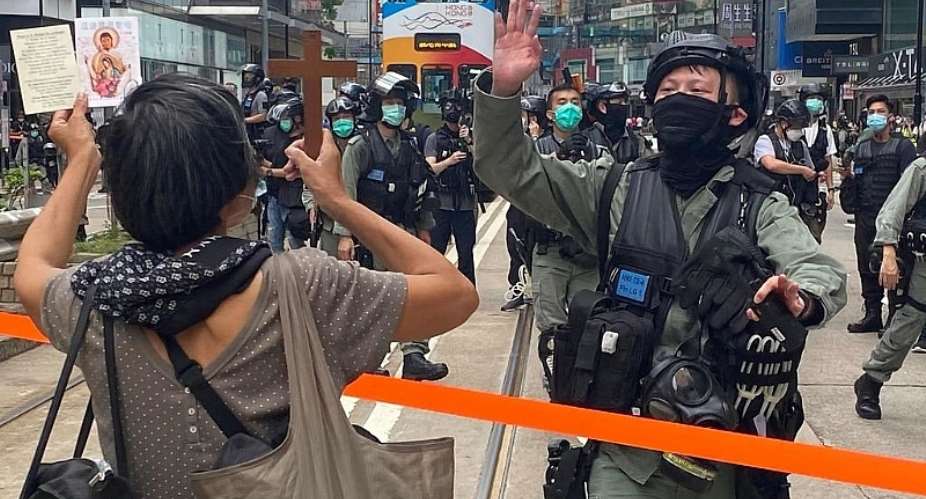Hong Kong's protest movement has flared up once again as thousands took to the streets on Sunday to protest against China's planned National Security Law for the city.
It was the largest demonstration in the semi-autonomous Chinese city since the start of the Covid-19 pandemic in January.
Police say they arrested at least 180 people for illegal assembly. This is in contrast to recent weeks where violations of social distancing regulations were instead used to break up protests.
The protest, in the shopping district of Causeway Bay, had been organised anonymously online, though a number of pro-democracy politicians did set up information booths in the street.
One of them, Tam Tak-chi, vice-president of the People's Power party, was arrested shortly after midday; he had claimed the public health lecture he organised was exempt from social distancing regulations, which restrict gatherings to no more than eight people.
Protesters had planned on marching the short distance to a sports ground in neighbouring Wan Chai but were pushed back by riot police soon after they set off. Though the protest was mild compared to many of the often violent ones last year, there were a few incidents.
A number of younger radical protesters blocked roads, lit fires and damaged property, and some were filmed beating a pro-government lawyer with whom they had an altercation.
Police fired rounds of tear gas and pepper balls and deployed water cannon. They made periodic charges on the blockaded streets, where tramcars stood motionless, and arrested dozens.
The police's public image, which took a battering during last year's protests, was not helped by a video where a group of riot police were filmed entering a nearby convenience store and taking drinks without paying. The video went viral, forcing the police's Facebook account to clarify that the items were later paid for.
China's intervention to push the National Security Law through has angered pro-democracy activists in Hong Kong. Though the city's mini-constitution, the Basic Law, stipulates that it must pass such legislation, governments have failed to do so since 1997. An attempt to table a law in 2003 drew massive protests and it was quickly shelved.
The widespread unrest last year has emboldened the Central Government to take a firm stance against what it calls secessionism, sedition and terrorism. Beijing has long claimed the Hong Kong protest movement aims to have the city secede from China, even though independence is not one of the movement's five core demands.
The resolution mandating the law is expected to be passed by China's National People's Congress on Thursday and the law could come into force by the end of the summer.
National security legislation has been used on the mainland to imprison dissidents such as the late Nobel peace laureate Liu Xiaobo and the human rights lawyer Wang Quanzhang.
Pro-democracy activists in Hong Kong fear that a similar law will be used to come down hard on anyone who criticises the Central Government, has overseas political connection or who simply voices their discontent, as thousands did on Sunday.





 Businesses running away from Ghana due to ‘dumsor’, high cost of electricity – B...
Businesses running away from Ghana due to ‘dumsor’, high cost of electricity – B...
 ‘If 2024 elections are held today, Bawumia will win all regions except Volta’ — ...
‘If 2024 elections are held today, Bawumia will win all regions except Volta’ — ...
 IMANI petitions CHRAJ to investigate EC over premature retirement, disposal of l...
IMANI petitions CHRAJ to investigate EC over premature retirement, disposal of l...
 Exercise fiscal restraint to preserve sound public finances in this ‘great elect...
Exercise fiscal restraint to preserve sound public finances in this ‘great elect...
 Uncomfortable economic indicators driving multinational companies out of Ghana –...
Uncomfortable economic indicators driving multinational companies out of Ghana –...
 You whine too much; focus and exercise your powers – Sammy Gyamfi to Kissi Agyeb...
You whine too much; focus and exercise your powers – Sammy Gyamfi to Kissi Agyeb...
 Limited voter registration: GES grants 18-year-old SHS/SHTS students 4-day permi...
Limited voter registration: GES grants 18-year-old SHS/SHTS students 4-day permi...
 Minerals Commission, EPA will be decentralized to all mining districts if electe...
Minerals Commission, EPA will be decentralized to all mining districts if electe...
 Tax officers will not sit in your shops when I become president – Bawumia assure...
Tax officers will not sit in your shops when I become president – Bawumia assure...
 Register to vote to be part of the change we all want – Mahama urges non-registe...
Register to vote to be part of the change we all want – Mahama urges non-registe...
